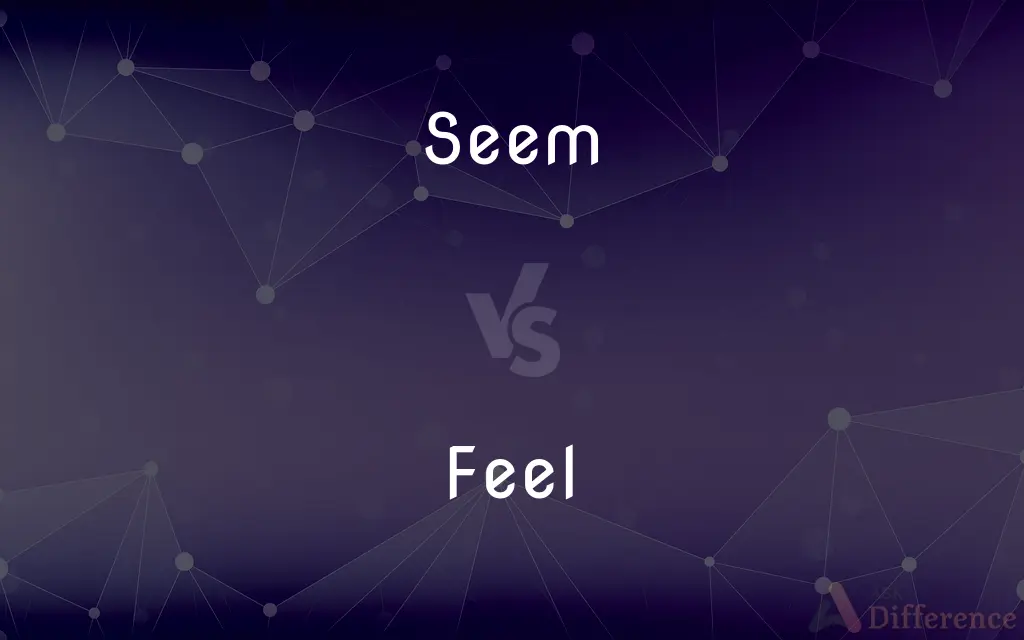Seem vs. Feel — What's the Difference?
By Tayyaba Rehman & Fiza Rafique — Updated on March 29, 2024
Seem focuses on outward appearance or impression, while feel centers on subjective, internal experience.

Difference Between Seem and Feel
Table of Contents
ADVERTISEMENT
Key Differences
Seem relates to how situations, things, or people appear to us based on external cues or context, indicating a perception that might not fully align with reality. Whereas feel is about the internal, subjective experience or intuition of a person, often related to emotions or physical sensations, and is less about external appearances.
Seem is often used in contexts where the appearance or impression of something is being evaluated from an observer's perspective, relying on visual or circumstantial evidence. On the other hand, feel is used when expressing personal, emotional, or physical states, emphasizing a more intimate, internal understanding or experience.
When using "seem," the speaker distances themselves from the certainty of the statement, suggesting a level of speculation or uncertainty. In contrast, using "feel" indicates a direct, personal experience or conviction, often with a strong sense of certainty based on one's own sensations or emotions.
"Seem" can be used without referring to the individual's internal state, making it useful for discussing general observations or shared perceptions. Meanwhile, "feel" inherently refers to the speaker's or subject's personal experience, making it less about collective understanding and more about individual insight.
While "seem" is often linked with appearances and can imply a potential difference between appearance and reality, "feel" suggests a depth of personal understanding or emotion that is not immediately observable to others.
ADVERTISEMENT
Comparison Chart
Focus
Outward appearance or impression
Internal experience or intuition
Usage Context
Evaluations based on external cues
Expressing emotions or physical sensations
Certainty Level
Implies speculation or uncertainty
Indicates direct experience or conviction
Personal vs. General
Can be impersonal or general
Inherently personal
Observable vs. Internal
Linked with what can be observed
Centers on internal states not visible to others
Compare with Definitions
Seem
Used to make a statement less direct or assertive.
She seems to be upset about something.
Feel
Experience a particular physical or emotional sensation.
I feel cold in this room.
Seem
Used to suggest a comparison or analogy.
That cloud seems like a ship.
Feel
Have a belief or impression, often based on intuition rather than fact.
I feel that we're making a mistake.
Seem
Appear to be something or to have a particular quality, based on one's perception or evidence.
The building seems old and deserted.
Feel
Express empathy or sympathy.
I feel for anyone in that situation.
Seem
Indicate a possible state or condition without certainty.
It seems like it might rain today.
Feel
Undergo a particular experience or condition.
She feels overwhelmed with work.
Seem
Express a speculative opinion.
He seems like a competent leader.
Feel
Be aware of through touching or being touched.
The fabric feels smooth.
Seem
To give the impression of being in a certain way; appear to be
The child seems healthy, but the doctor is concerned. The house seems to be in good condition.
Feel
Be aware of (a person or object) through touching or being touched
She felt someone touch her shoulder
You can feel the soft grass beneath your feet
Seem
Used to call attention to one's impression or understanding about something, especially in weakening the force of a following infinitive
I can't seem to get the story straight.
Feel
Experience (an emotion or sensation)
She started to feel really sick
It felt odd to be alone again
We feel very strongly about freedom of expression
I felt a sense of excitement
Seem
To appear to be probable or evident
It seems you object to the plan. It seems like rain.
Feel
Have a belief or impression, especially without an identifiable reason
She felt that the woman positively disliked her
Seem
(copulative) To appear; to look outwardly; to be perceived as.
He seems to be ill.
Her eyes seem blue.
It must have seemed to her she was safe.
How did she seem to you?
He seems not to be at home.
It seems like rain.
Feel
An act of touching something to examine it.
Seem
(obsolete) To befit; to beseem.
Feel
A sensation given by an object or material when touched
Nylon cloth with a cotton feel
Seem
To appear, or to appear to be; to have a show or semblance; to present an appearance; to look; to strike one's apprehension or fancy as being; to be taken as.
Thou picture of what thou seem'st.
All seemed well pleased; all seemed, but were not all.
There is a way which seemeth right unto a man; but the end thereof are the ways of death.
A prince of Italy, it seems, entertained his mistress on a great lake.
Ham. Ay, madam, it is common.Queen. If it be,Why seems it so particular with thee?Ham. Seems, madam! Nay, it is; I know not "seems."
Feel
Feelings of heightened emotion
Fans will undoubtedly get the feels when they see how things haven't changed
I cry at everything, even the types of movies you wouldn't expect to give you all the feels
Seem
To befit; to beseem.
Feel
To perceive through the sense of touch
Feel the velvety smoothness of a peach.
Seem
Give a certain impression or have a certain outward aspect;
She seems to be sleeping
This appears to be a very difficult problem
This project looks fishy
They appeared like people who had not eaten or slept for a long time
Feel
To perceive as a physical sensation
Feel a sharp pain.
Feel the cold.
Seem
Seem to be true, probable, or apparent;
It seems that he is very gifted
It appears that the weather in California is very bad
Feel
To touch
Reached out and felt the wall.
Seem
Appear to exist;
There seems no reason to go ahead with the project now
Feel
To examine by touching
Felt the fabric for flaws.
Seem
Appear to one's own mind or opinion;
I seem to be misunderstood by everyone
I can't seem to learn these Chinese characters
Feel
To test or explore with caution
Feel one's way in a new job.
Feel
To undergo the experience of
Felt my interest rising.
Felt great joy.
Feel
To be aware of; sense
Felt the anger of the crowd.
Feel
To be emotionally affected by
She still feels the loss of her dog.
Feel
To be persuaded of (something) on the basis of intuition, emotion, or other indefinite grounds
I feel that what the informant says may well be true.
Feel
To believe; think
She felt his answer to be evasive.
Feel
To experience the sensation of touch.
Feel
To produce a particular sensation, especially through the sense of touch
The sheets felt smooth.
Feel
To produce a particular impression; appear to be; seem
It feels good to be home. See Usage Note at well2.
Feel
To be conscious of a specified kind or quality of physical, mental, or emotional state
Felt warm and content.
Feels strongly about the election.
Feel
To seek or explore something by the sense of touch
Felt for the light switch in the dark.
Feel
To have compassion or sympathy
I feel for him in his troubles.
Feel
Perception by touch or by sensation of the skin
A feel of autumn in the air.
Feel
The sense of touch
A surface that is rough to the feel.
Feel
An act or instance of touching or feeling
Gave the carpet a feel.
Feel
An overall impression or effect
"gives such disparate pictures ... a crazily convincing documentary feel" (Stephen King).
Feel
Intuitive awareness or natural ability
Has a feel for decorating.
Feel
(heading) To use or experience the sense of touch.
Feel
To become aware of through the skin; to use the sense of touch on.
You can feel a heartbeat if you put your fingers on your breast.
I felt cold and miserable all night.
Feel
(transitive) To find one's way (literally or figuratively) by touching or using cautious movements.
I felt my way through the darkened room.
I felt my way cautiously through the dangerous business maneuver.
Feel
(intransitive) To receive information by touch or by any neurons other than those responsible for sight, smell, taste, or hearing.
Feel
(intransitive) To search by sense of touch.
He felt for the light switch in the dark.
Feel
(heading) To sense or think emotionally or judgmentally.
Feel
(transitive) To experience an emotion or other mental state about.
I can feel the sadness in his poems.
Feel
(transitive) To think, believe, or have an impression concerning.
I feel that we need to try harder.
Feel
To experience an emotion or other mental state.
He obviously feels strongly about it.
She felt even more upset when she heard the details.
Feel
(intransitive) To sympathise; to have the sensibilities moved or affected.
I feel for you and your plight.
Feel
(transitive) To be or become aware of.
Feel
(transitive) To experience the consequences of.
Feel my wrath!
Feel
(copulative) To seem (through touch or otherwise).
It looks like wood, but it feels more like plastic.
This is supposed to be a party, but it feels more like a funeral!
Feel
To understand.
I don't want you back here, ya feel me?
Feel
(archaic) The sense of touch.
Feel
A perception experienced mainly or solely through the sense of touch.
Bark has a rough feel.
Feel
A vague mental impression.
You should get a feel for the area before moving in.
Feel
An act of fondling.
She gave me a quick feel to show that she loves me.
Feel
A vague understanding.
I'm getting a feel for what you mean.
Feel
An intuitive ability.
She has a feel for music.
Feel
A feeling; an emotion.
I know that feel.
Feel
Alternative form of fele
Feel
Alternative form of fele
Feel
Alternative form of fele
Feel
To perceive by the touch; to take cognizance of by means of the nerves of sensation distributed all over the body, especially by those of the skin; to have sensation excited by contact of (a thing) with the body or limbs.
Who feelThose rods of scorpions and those whips of steel.
Feel
To touch; to handle; to examine by touching; as, feel this piece of silk; hence, to make trial of; to test; often with out.
Come near, . . . that I may feel thee, my son.
He hath this to feel my affection to your honor.
Feel
To perceive by the mind; to have a sense of; to experience; to be affected by; to be sensible of, or sensitive to; as, to feel pleasure; to feel pain.
Teach me to feel another's woe.
Whoso keepeth the commandment shall feel no evil thing.
He best can paint them who shall feel them most.
Mankind have felt their strength and made it felt.
Feel
To take internal cognizance of; to be conscious of; to have an inward persuasion of.
For then, and not till then, he felt himself.
Feel
To perceive; to observe.
Feel
To have perception by the touch, or by contact of anything with the nerves of sensation, especially those upon the surface of the body.
Feel
To have the sensibilities moved or affected.
[She] feels with the dignity of a Roman matron
And mine as man, who feel for all mankind.
Feel
To be conscious of an inward impression, state of mind, persuasion, physical condition, etc.; to perceive one's self to be; - followed by an adjective describing the state, etc.; as, to feel assured, grieved, persuaded.
I then did feel full sick.
Feel
To know with feeling; to be conscious; hence, to know certainly or without misgiving.
Garlands . . . which I feelI am not worthy yet to wear.
Feel
To appear to the touch; to give a perception; to produce an impression by the nerves of sensation; - followed by an adjective describing the kind of sensation.
Blind men say black feels rough, and white feels smooth.
Feel
Feeling; perception.
To intercept and have a more kindly feel of its genial warmth.
Feel
A sensation communicated by touching; impression made upon one who touches or handles; as, this leather has a greasy feel.
The difference between these two tumors will be distinguished by the feel.
Feel
An intuitive awareness;
He has a feel for animals
It's easy when you get the feel of it
Feel
The general atmosphere of a place or situation and the effect that it has on people;
The feel of the city excited him
A clergyman improved the tone of the meeting
It had the smell of treason
Feel
A property perceived by touch
Feel
Undergo an emotional sensation;
She felt resentful
He felt regret
Feel
Come to believe on the basis of emotion, intuitions, or indefinite grounds;
I feel that he doesn't like me
I find him to be obnoxious
I found the movie rather entertaining
Feel
Perceive by a physical sensation, e.g., coming from the skin or muscles;
He felt the wind
She felt an object brushing her arm
He felt his flesh crawl
She felt the heat when she got out of the car
Feel
Seem with respect to a given sensation given;
My cold is gone--I feel fine today
She felt tired after the long hike
Feel
Have a feeling or perception about oneself in reaction to someone's behavior or attitude;
She felt small and insignificant
You make me feel naked
I made the students feel different about themselves
Feel
Undergo passive experience of:
We felt the effects of inflation
Her fingers felt their way through the string quartet
She felt his contempt of her
Feel
Be felt or perceived in a certain way;
The ground feels shaky
The sheets feel soft
Feel
Grope or feel in search of something;
He felt for his wallet
Feel
Examine by touch;
Feel this soft cloth!
The customer fingered the sweater
Feel
Examine (a body part) by palpation;
The nurse palpated the patient's stomach
The runner felt her pulse
Feel
Find by testing or cautious exploration;
He felt his way around the dark room
Feel
Produce a certain impression;
It feels nice to be home again
Common Curiosities
How do I use "seem" in a sentence?
You can use "seem" when discussing appearances or impressions, e.g., "You seem tired today."
Can something seem and feel different at the same time?
Yes, something can seem one way based on external appearances but feel different based on personal experience.
What does it mean to feel sad?
To experience sadness as an emotional state.
Is it correct to say "It feels like it will rain"?
Yes, this expresses a personal intuition or sensation regarding the weather.
How does "seem" differ from "look"?
"Seem" is broader, including non-visual cues, while "look" is specifically about visual appearance.
How can "feel" indicate empathy?
By expressing understanding or sharing in someone else's emotional state, e.g., "I really feel for you."
Can I use "feel" when talking about opinions?
Yes, "feel" can express opinions based on personal intuition or emotion, e.g., "I feel this is the right decision."
What does it mean to seem happy?
To appear happy based on outward expressions or circumstances, regardless of one's actual emotional state.
Can animals seem and feel?
Animals can seem a certain way to observers and can feel physical sensations and possibly emotions.
Why use "seem" instead of saying something is a fact?
To indicate that the statement is based on appearances or limited information, not certainty.
Can "seem" be used without specifying who it seems that way to?
Yes, it can imply a general or unspecified perspective, e.g., "It seems impossible."
Can "seem" and "feel" be used interchangeably?
Generally, no, because they refer to different experiences: outward appearances versus internal sensations.
Is "feel" subjective or objective?
"Feel" is subjective, as it relates to personal experiences or sensations.
What does "it seems that" imply?
It introduces a statement with a degree of uncertainty or speculation.
How do I describe a physical sensation using "feel"?
Use "feel" followed by the sensation, e.g., "I feel a sharp pain in my arm."
Share Your Discovery

Previous Comparison
Aliquot vs. Allocate
Next Comparison
Bleach vs. DetergentAuthor Spotlight
Written by
Tayyaba RehmanTayyaba Rehman is a distinguished writer, currently serving as a primary contributor to askdifference.com. As a researcher in semantics and etymology, Tayyaba's passion for the complexity of languages and their distinctions has found a perfect home on the platform. Tayyaba delves into the intricacies of language, distinguishing between commonly confused words and phrases, thereby providing clarity for readers worldwide.
Co-written by
Fiza RafiqueFiza Rafique is a skilled content writer at AskDifference.com, where she meticulously refines and enhances written pieces. Drawing from her vast editorial expertise, Fiza ensures clarity, accuracy, and precision in every article. Passionate about language, she continually seeks to elevate the quality of content for readers worldwide.













































